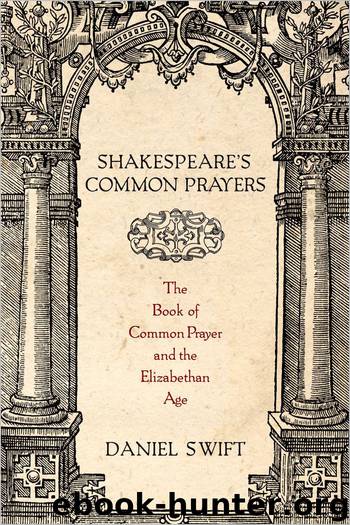Shakespeare's Common Prayers by Swift Daniel;

Author:Swift, Daniel;
Language: eng
Format: epub
Publisher: Oxford University Press, USA
Published: 2012-04-05T04:00:00+00:00
THE REFORMATION OF burial rites was partial and compromised; it stuttered in contradictions and half-done work, a thing of shreds and patches. In the generations between us and then, the cadence of the prayer book has won authority of its own. Perhaps the best metaphor is architectural. The lines of the liturgy are the grooves in a flight of old stone steps, and as we come to that staircase then it is sensible that we should follow upon its memory of footfalls. This sense divides us from the worshippers of Shakespeare’s England. They saw flaws in the prayer book and felt the struggle between alternatives; they found it neither perfect nor inevitable.
“An Admonition to the Parliament” (1572) was, according to its modern editors, “the first open manifesto of the puritan party,” and it insists that the Book of Common Prayer is insufficiently purified. “This book is an unperfected book, culled & picked out of that popish dunghill, the Mass book full of abominations,” the admonition spits, and lists its failings: in the eleventh section, on the burial rite, it notes that “prayer for the dead is maintained.”36 In 1610, a defense of those nonconforming ministers who lost their living after the Hampton Court Conference, agreed. “Perfect consummation & bliss both in body and soul seemeth to be desired as well for the now buried brother, and all the other departed in the true faith, whose souls only (as yet) be in felicity, as for the living,” the petition noted among its list of faults in the ecclesiology of the new church.37 They were correct. The Elizabethan Primer—a new edition of the 1545 Henrician Primer, published in 1559, 1560, and 1568, and intended for private prayer—openly retained intercessory prayers in the Dirige. Following the traditional burial psalm “Lauda anima mea Dominum” is the prayer:
Lord, give thy people eternal rest,
And light perpetual shine on them.
From the gates of hell,
Lord, deliver their souls
and the Dirige ends with the supplication “be merciful to the souls of thy servants, being departed from this world in the confession of thy name.”38 Here is the old promise: that we may still touch the dead. While the Book of Common Prayer removed the requiem mass from the burial rite, the Latin prayer book—the Liber Precum Publicarum, published in 1560—retained a Communion service at the burial: “Celebratio Coenae Domini, in funebribus.”39
This is a history of words and their relation to faith; these are the tangled and troubled poetics of theology. The same liturgy that attempted to remove traditional intercession from the Communion rite did so by using the word that promised intercession. “Take and drink ye all of this: do this in remembrance of me” instructs the priest in the rite for Communion, and he leads the congregation in general confession. “The remembrance of them is grievous unto us,” he says, and then at the moment of administration we kneel and take bread “in remembrance that Christ died for thee,” and we take wine “in remembrance that Christ’s blood was shed for thee” (Cummings, 131, 134, 137).
Download
This site does not store any files on its server. We only index and link to content provided by other sites. Please contact the content providers to delete copyright contents if any and email us, we'll remove relevant links or contents immediately.
4 3 2 1: A Novel by Paul Auster(11817)
The handmaid's tale by Margaret Atwood(7468)
Giovanni's Room by James Baldwin(6825)
Asking the Right Questions: A Guide to Critical Thinking by M. Neil Browne & Stuart M. Keeley(5366)
Big Magic: Creative Living Beyond Fear by Elizabeth Gilbert(5361)
Ego Is the Enemy by Ryan Holiday(4967)
On Writing A Memoir of the Craft by Stephen King(4673)
The Body: A Guide for Occupants by Bill Bryson(4595)
Ken Follett - World without end by Ken Follett(4452)
Bluets by Maggie Nelson(4279)
Adulting by Kelly Williams Brown(4243)
Eat That Frog! by Brian Tracy(4167)
Guilty Pleasures by Laurell K Hamilton(4126)
White Noise - A Novel by Don DeLillo(3837)
The Poetry of Pablo Neruda by Pablo Neruda(3825)
Fingerprints of the Gods by Graham Hancock(3746)
Alive: The Story of the Andes Survivors by Piers Paul Read(3743)
The Book of Joy by Dalai Lama(3710)
The Bookshop by Penelope Fitzgerald(3625)
